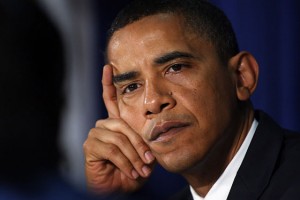Today: It’s hard not to see a double standard in the West’s responses to the Arab Spring.
Western governments have had no problem in calling for Muammar Gaddafi to go. They have condemned Bashar al-Assad in Syria and Ali Abdullah Saleh in Yemen for firing on protesters, detention without trial and the usual responses of repressive regimes.
But on the topic of the equally repressive Khalifa family in Bahrain, diplomats of all stripes have been much more restrained.
Meanwhile, the Saudis have sent 1,000 troops to its neighbour to help put down the “coup” — what anyone else would call peaceful protests. Bahraini activists risk being arrested or threatened. Last week a fourth detainee died in police custody in less than two weeks. Witnesses said his body, like the others, bore signs of abuse.
The strategy of inertia could well blow up in the West’s face. The protesters in Bahrain are mainly Shiites, who form the majority of the population; the rulers are Sunni.
Shiite Iran next door is the wild card. No one can predict how the ayatollahs will respond. They are already suspected of covert meddling and it’s hard to imagine they will sit by while their co-religionists are massacred.
At the British newspaper The Guardian, Madeleine Bunting attributes the West’s silence in part to Britain’s relationship with the ruling Bahraini family.
“It has been one of the most successful chapters in British imperial domination; the Al Khalifa dynasty signed its first treaty with the British in 1820 and they finally ‘left’ in 1971. The British have backed a repressive regime in a very cosy, mutually advantageous relationship of finance, military training, arms deals and royal ceremony (one of the less edifying aspects of the imperial endgame has been the use of the royal family to flatter and seduce client regimes, however unpalatable). In the last few months the Bahrain government has beaten, killed, tortured the Shia protest movement …The west has done little but mumble incoherently; too many interests are at stake to live up to the grand moral rhetoric now being lavished on Libya.”
In an interview with the Iranian-owned Press TV, Christopher Walker, a former Moscow and Middle East correspondent of the London Times, has no problem in connecting the dots.
“The fact is that Bahrain is the regional base of the U.S. Fifth Fleet, and the U.S. Fifth Fleet is its major strategic arm in the Middle East. Although it is based in Bahrain, it is crucial to the current Washington policy in the region. So they are very worried that if something was to happen in Bahrain of deep instability, that Fleet would lose its base. That is really the guiding force …
[Covering] Bahrain has not frankly been of the Western media’s interest. You can see a conspiracy behind it if you want. It was the West’s interest not to encourage the downfall of the ruling Khalifa family in Bahrain. Bahrain is also a much easier place for the authorities to restrict press coverage. In Libya, for instance, when journalists could not get in, because Gaddafi did not at that time allow them, they just drove into the East or got there another way. But in Bahrain, they have to go via the airport and they are just not given visas.”
To have different levels of tolerance for different despots raises awkward questions, says The Observer in an editorial.
“One obvious lesson for the west from recent upheaval in the Middle East is that propping up authoritarian regimes on the grounds that they make stable allies is a terrible policy.
The stability procured by despotism is an illusion. Brittle police states can contain, but never satisfy, a captive people’s appetite for better lives. Eventually, they shatter and the more rigid the apparatus of repression, the more explosive the change when it comes.
That has been demonstrated clearly enough in North Africa and yet the west struggles to apply the lesson to the Arabian Peninsula. The contagious spirit of democratic springtime that provoked protests in Tunisia, Egypt and Libya also reached Bahrain, Yemen, Saudi Arabia. But there the west has been markedly less inclined to cheer it on.”
At the Christian Science Monitor, Kristen Chick explains why the U.S.’s silence could backfire:
“While the U.S. stance is generally attributed to an attempt to protect regional interests, the festering situation in Bahrain is actually increasing Iran’s opportunity for influence in the region and widening rifts between Arab nations – neither of which are in the interest of the U.S. … the U.S. failure to condemn human rights abuses committed by the Bahraini security forces while condemning such abuses in Libya and Syria is undermining any credibility it had with Bahrainis. If Saudi and the U.S had hoped to curtail Iran’s influence through Bahrain, they may have instead given it an opening …
Indeed, the situation in Bahrain has given Iran repeated opportunities to publicly criticize the oppression of Shiites and criticize Bahrain.”
By Araminta Wordsworth




































April 22nd, 2011 at 8:24 pm
you do know thst thr ptotrdters in bahrain are only 30 000 while the one who went outand supported the royal family was 450 000 and bahrains population is only 700 000,,,,did i forget to mention that the militry and securty didnt participate and the militiry alone is above 60 000….and what u call peacful protesters blocks streets and atack asian workers and sunneh people…..also the shia took over the salmaniya hospital and turned it into an hq and hid weapons there and didnt allow sunneh to be healed there
April 23rd, 2011 at 8:16 pm
maybe your right. but the most important fact is that the government KILLED protestors whilst the protestors didn’t kill anyone. The government could have just locked them up and put them on trial instead of killing them.